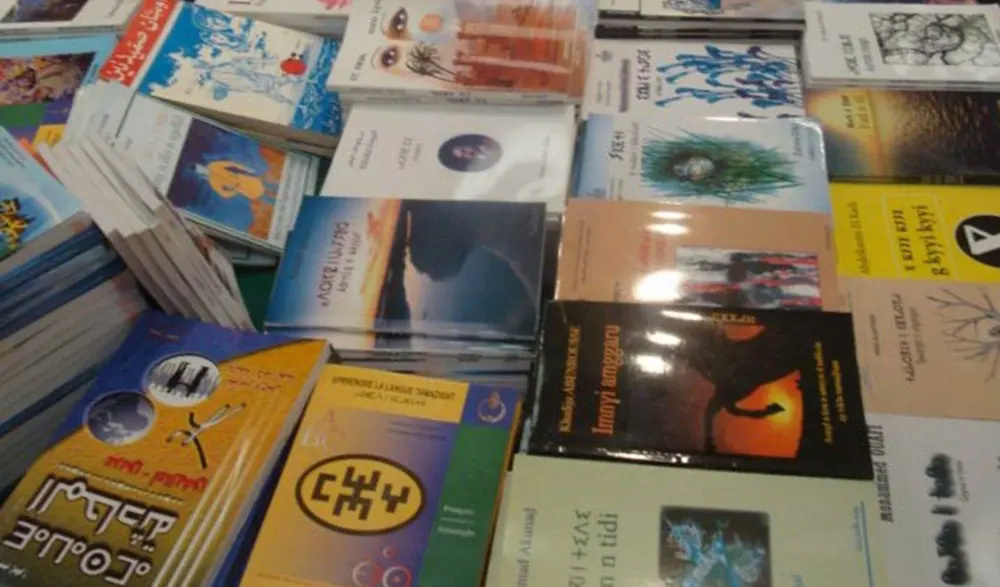“Amazigh Literature from Orality to Codification: Readings and Approaches” Topic of a Guelmim Symposium

Researchers and those interested in history and heritage gathered in a scientific symposium on the topic “Amazigh Literature from Orality to Writing: Readings and Approaches,” organized today, Wednesday, in Guelmim, by the Association of Tamont Ifrane of the Small Atlas, within the activities of the fourth edition of the Tamont Forum for Creativity and Amazigh Literature on March 6 and 9.
This inaugural symposium of this forum, organized in partnership with the Royal Institute of Amazigh Culture, and in cooperation with the Regional Center for Educational and Training Professions of Guelmim Ouadnoun, was an occasion to examine the emergence of Amazigh literature and highlight the various milestones it has made from the oral stage to the blogging and writing stage.
The head of the Tamont-Ifrane Small Atlas Association, Mahfouz Al-Kabous, confirmed in a statement that this symposium, organized within the activities of the Tamont Forum for Creativity and Amazigh Literature, is an opportunity to discuss and approach Amazigh literature in its formal and aesthetic aspects, adding that this forum constitutes an annual date for approaching the Amazigh literary achievement in terms of Its issues and problems, as well as an opportunity to highlight and strengthen the presence of Amazigh creativity and creators in the cultural and artistic scene.

During this symposium, the participants stressed that Amazigh literature, like literature in various world cultures, proceeded from what was oral to the stage of codification, and that what has been written down in this literature until now is a small trace of what Amazigh culture abounds in, calling for the necessity of preserving this literature and preserving it within Moroccan culture is characterized by diversity and pluralism.
In this context, Ahmed Saber, a professor at the Faculty of Arts and Human Sciences at Ibn Zohr University in Agadir, highlighted in his intervention that this symposium constituted an opportunity to study and approach the status of Amazigh literature in terms of the extent of progress in teaching the Amazigh language, especially in its literary aspect, in educational and university institutions, recalling in this regard Examples of scientific research carried out in this field, as well as the role of the Royal Institute of Amazigh Culture in supporting and teaching the Amazigh language at the university.
For his part, Mohamed Yahyaoui, Secretary-General of the Regional Center for Education and Training Professions in the Guelmim-Oued Noun region, stressed the need to reformulate and standardize Amazigh literature through writing and blogging in a new style that is in line with the social expectations that currently show interest in the Amazigh component, which is characterized by diversity and pluralism in everything that is oral.

He also called for the necessity of reviving the meanings and connotations of the Amazigh heritage at the level of the cultural and spatial dimension of the Amazigh person, understanding the heritage in a deep way, and linking it to the cultural patterns in which the Amazigh person creates, whether at the level of theatre, proverbs and riddles, or at the level of poetic debate.
As for Mohamed Aqir, a professor at Ibn Zohr University in Agadir, he stopped at the emergence of Amazigh literature and the moment of its transition from oral to writing through codification, indicating that this codification was based primarily on the stock of memory through the use of letters and symbols through a group of creations in writing such as stories and poetry. And others.
He highlighted that the beginning of any literature, regardless of its type, is not in writing, but rather it is transmitted through oral narration, which takes thousands of years after developing intellectual and mental skills that enabled it to reach the stage of blogging and writing.
The activities of the Tamont Forum for Creativity and Amazigh Literature, in its fourth edition, include the organization of several activities, including training workshops for youth and childhood on teaching the story and writing short stories in Amazigh, as well as an Amazigh book exhibition.
Source: websites

